

Leica S9 i, S9 D and S9E stereo microscopes: Take advantage of the cutting-edge features of the latest digital cameras
Our LM microscope adapters with integrated precision optics allow you to use powerful digital cameras with your Leica microscope. Depending on your specific requirements and application, you have the freedom to select the digital camera that optimally suits your needs: a DSLR or mirrorless system camera, a dedicated microscope camera, a C-mount camera or a high-speed camera. This allows you to achieve a significantly higher level of image quality and still save costs.
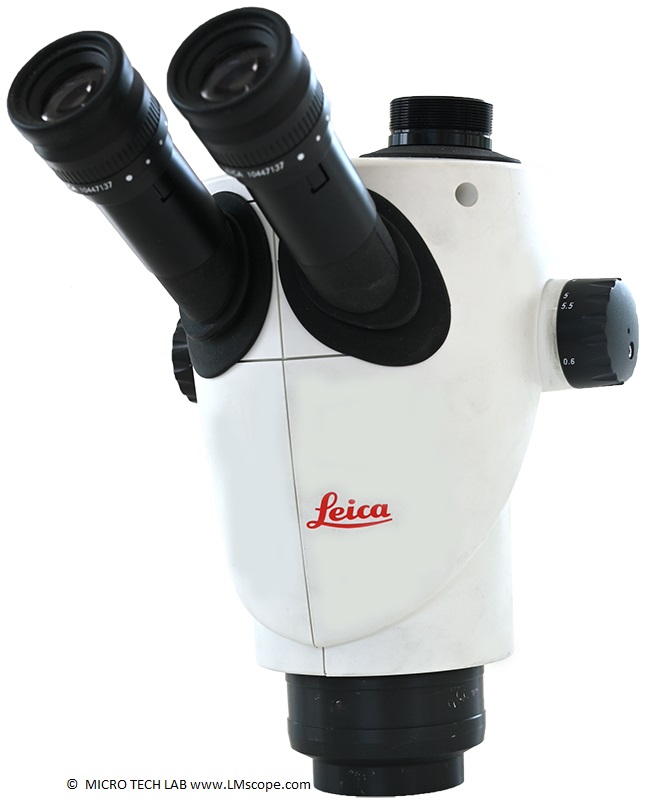
Leica’s S9 series of microscopes was launched in 2017 and continued its production run until around 2023. The microscopes in this series are equipped with a Greenough optical system and were specifically developed for use in industrial and scientific settings.
The Leica S9 series features three microscope models:
- Leica S9 E (binocular)
- Leica S9 D with phototube (50/50 beam splitter)
- Leica S9 i with integrated 10 MP digital camera (other camera systems can only be attached to the eyepiece tube)
- Leica S9 APO with phototube (with 100/100 beam switching)
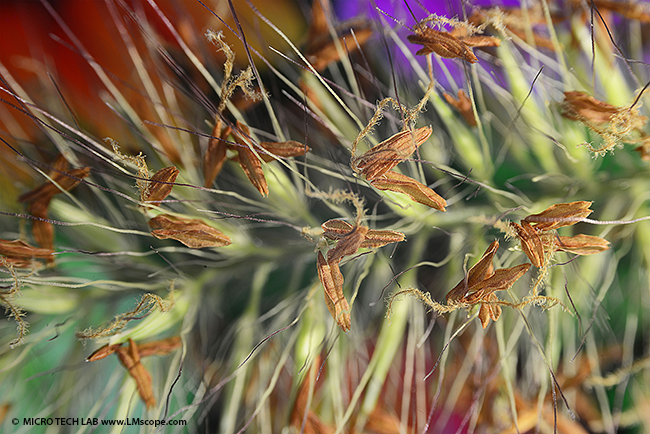
Shown in the image: fountain grass (pennisetum) under the S9 D at 15x magnification
Key microscope features:
• Stereo microscope with Greenough optical design (10°)
• Magnification range 6.1x to 55x
• Maximum numerical aperture
• FusionOptics technology
• Zoom factor 9:1
• Supplementary lenses 0.5x, 0.63x, 0.75x, 1.6x, 2.0x (apochromats) available
• Working distance without supplementary lenses: 122 mm
• Maximum field of view 37.7 mm
Leica’s S9 series employs the company’s proprietary FusionOptics technology, a concept designed to combine high resolution and depth of field for ideal image quality during visual observation. The FusionOptics principle makes use of the two separate beam paths of the S9 stereo microscope, one beam with different lens diameter for each eye. The right optical path of the microscope delivers an image with the highest possible resolution, while the left channel provides an image with maximum depth of field.
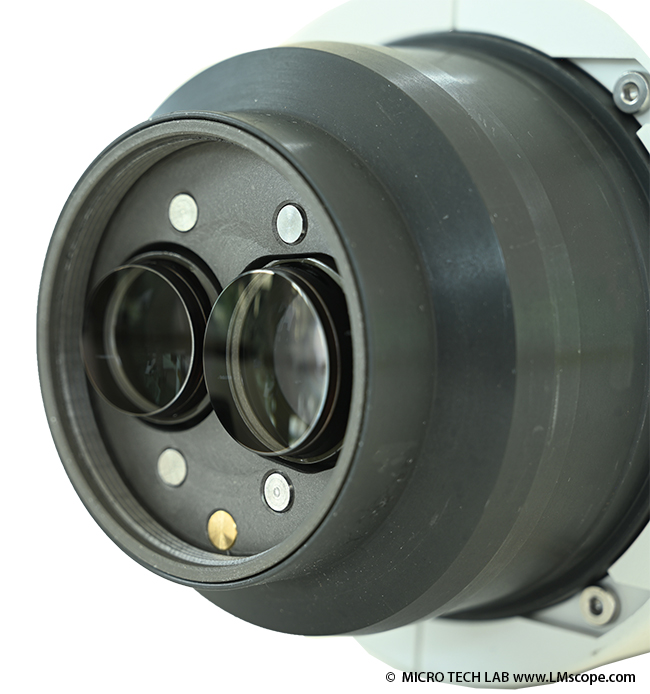
As the observer uses both eyes, the brain merges the visual information from both channels into a single, optimal spatial image with higher resolution and depth of field.
The Leica S9 D microscope features a Greenough optical system with two optical paths inclined at a 10° angle. When working under the microscope, this stereo effect is particularly helpful for guiding tools (tweezers, soldering irons or scalpels) and moving them into position in the space above the specimen. This design, along with the large working distance of 122 mm, significantly enhances workflow efficiency.
The microscope body is equipped with precision zoom optics with a factor of 9:1, allowing the magnification to be set from 6.1x to 55x. Pre-defined click stops are provided at 10x, 20x, 30x, 40x and 50x magnification.
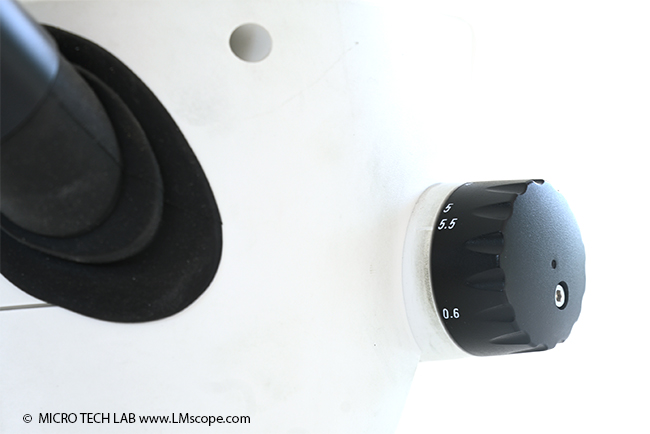
The eyepiece tubes have an internal diameter of 30 mm and a 35 degree viewing angle. The standard version of the microscope is equipped with widefield 10x/23 eyepieces, resulting in an object field diameter of 37 mm at the lowest magnification.
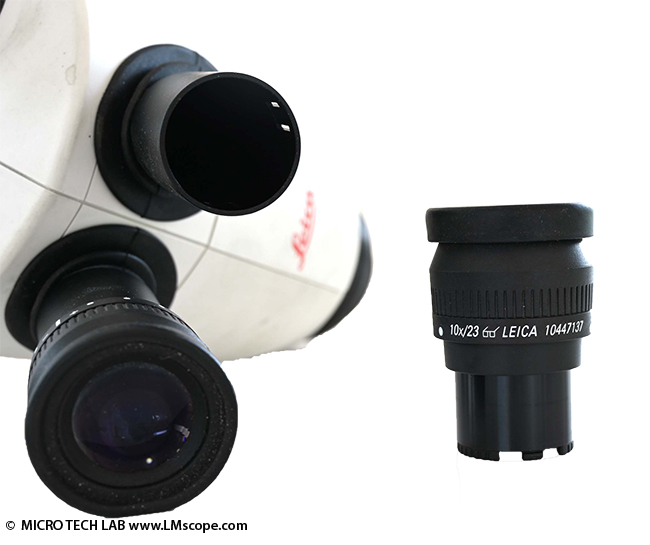
Mounting the camera
The Leica S9 D has a separate phototube with an M38 external thread.
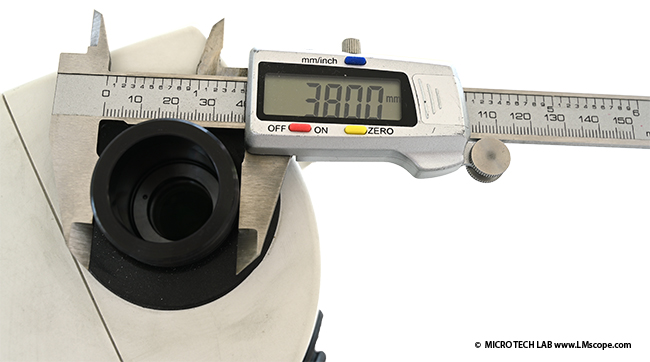
This version is the most flexible of the three models in the S9 series in terms of camera compatibility: virtually any camera (C-mount camera, digital SLR or mirrorless system camera, special microscope camera or high-speed camera) can be attached to the microscope with one of our LM microscope adapters.
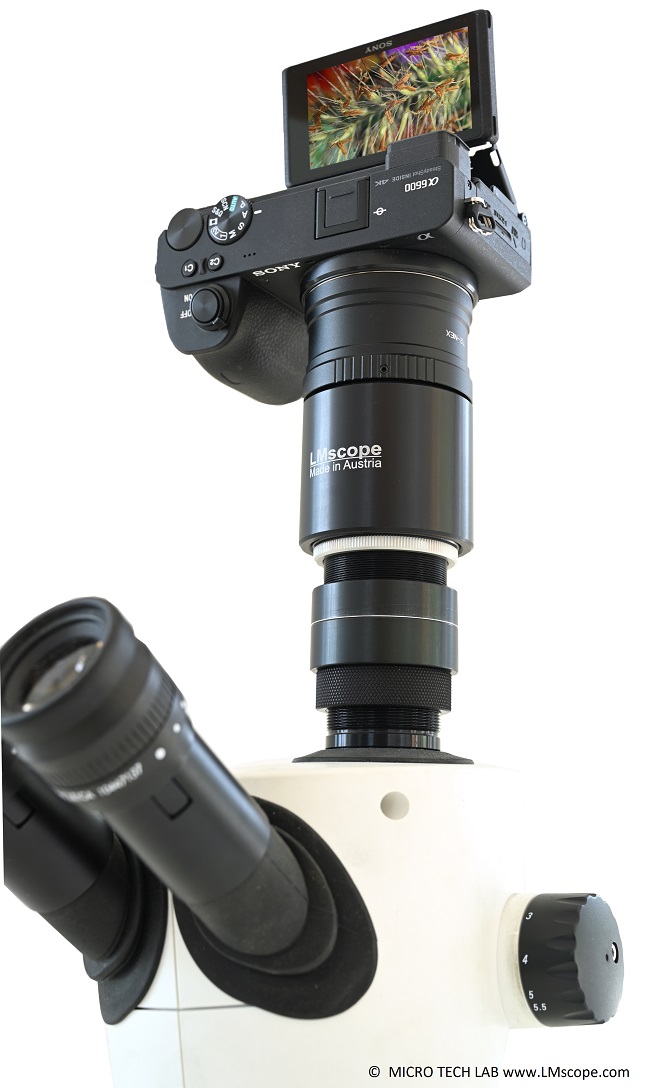
Digital camera (high-resolution mirrorless system camera) attached to the phototube of the Leica S9 D
As an alternative, the camera can also be attached to the eyepiece tube. To attach the camera, one of the microscope’s eyepieces is removed and the camera-adapter combination is put in its place.
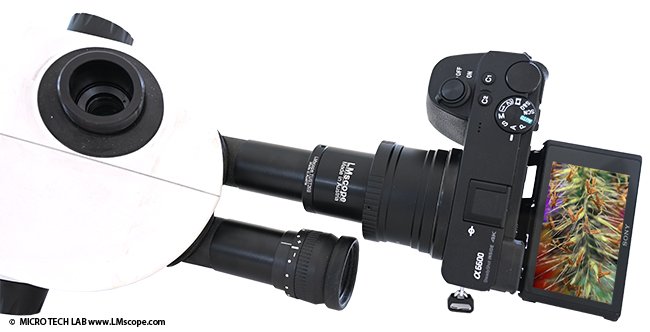
This adapter solution is very flexible because it can also be used on other microscopes with standard-sized eyepiece tubes (23.2 mm and 30 mm). It should be noted, however, that this configuration limits the user to a single eyepiece for direct observation. The optical quality achieved with this method is very good and matches that of a phototube adapter solution. With this connection method, an extensive range of cameras can be attached to the Leica S9 E stereo microscope, which does not come with a phototube.
The S9 series also includes the S9 i model, which comes with an integrated 10 MP digital camera. This microscope offers versatile connectivity options (USB, Ethernet or HDMI), allowing it to interface seamlessly with PCs, internal networks or high-resolution monitors. However, the built-in camera doesn’t fully exploit the microscope’s optical capabilities, a limitation that is particularly noticeable at lower magnifications, where a higher pixel count could significantly enhance image quality. Using a more advanced camera is therefore only possible by attaching it to the eyepiece tube of the microscope.
The S9 series is available with a variety of stands and illumination options, including both incident and transmitted light. The TL3000 Ergo transmitted-light base supports the following observation methods: brightfield, darkfield and Rotterman contrast.
The microscope head of the S9 series microscopes has a stand mount size with a diameter of 75 mm. This common size is also used by other microscope manufacturers.
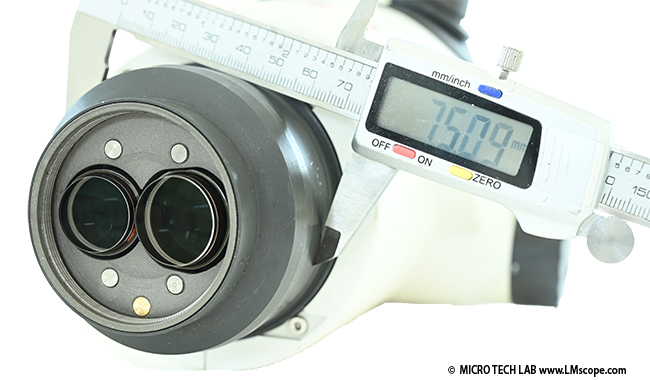
The S9 APO is a unique model in the S9 series. It is designed for higher magnifications (10x to 80x) with a large 8:1 zoom range and, like the S9 D, has a separate phototube. The phototube is equipped with a switch that directs 100% of the light either to one of the optical paths of the eyepiece tube or to the phototube. The maximum working distance is 75 mm.
In 2023, Leica replaced the S9 series with the Ivesta 3 microscope, which essentially has very similar features.
25.09.2024Photography:
Fitting the microscope to digital single-lens reflex (DSLR), mirrorless interchangeable-lens cameras (MILC ), digital single-lens mirrorless (DSLM) or C-mount cameras is easy with our LM digital SLR adapters, which feature a plan achromatic optical system. Our products make it possible to capture top-quality microscope images. To help you select the adapter that is right for your camera, we have set up an online configurator on our website. You can also email us – ideally with attached photographs of your microscope.
Modern DSLR and single-lens mirrorless (DSLM) offer the latest technology and are generally very well suited for microscopy applications. Most of them can be controlled remotely via PC/Mac. Because of their high sales volumes, they offer an excellent price/performance ratio compared to special-purpose microscope cameras.
Features of top DSLR and single-lens mirrorless cameras (DSLM):
- Large, powerful full-frame sensors (36 x 24 mm)
- Sensor resolution of 61 megapixels or 240 megapixels with Pixel Shift technology
- High light sensitivity (ISO 400,000+)
- Extensive dynamic range (up to 15 aperture stops/f-stops)
- Short exposure times (1/8000 second) up to 1/32,000 seconds using the digital shutter
- 4K Ultra HD or 8K Ultra HD video function
- Live video capture on external monitors in ultra HD quality
In most cases, these cameras are significantly more powerful than microscope cameras with smaller sensors (1/2" or 2/3"). On our website you will find our current camera recommendations and a camera ranking which is specifically tailored to microscopy applications.
| Ordering code | Product description | Price | Price | Available |
 Leica_M38_f240_VAR | Focusable LM Direct Imager adapter with anti-reflective coating, plan achromatic precision optics for Leica stereomicroscopes with phototube with M38 external thread, for digital SLR and mirrorless system cameras with APS-C or MFT sensor, focal length 240mm, including camera bayonet mount Operating Instructions | Euro 2490,-- | US $ 2788.8 |  |
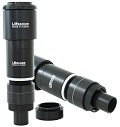 Leica_M38_f320_VAR | Focusable LM Direct Imager adapter with anti-reflective coating, plan achromatic precision optics for Leica stereomicroscopes with phototube with M38 external thread, for digital SLR and mirrorless system cameras with full-frame or APS-C sensors, focal length 320mm, including camera bayonet mount Operating Instructions0 Data Sheet1 | Euro 2890,-- | US $ 3236.8 |  |
New LM Digital Adapter for: Sony Alpha 9 III / Nikon Z9 / Nikon Z8 / Sony Alpha 7R V / Sony Alpha 1 II / Sony Alpha 1 / Sony Alpha 9 II (ILCE-9M2) / Sony FX3 Cinema Line / Sony Alpha 9 / Nikon D6 / Canon EOS R3 / Canon EOS R6 Mark II / Canon EOS R8 / Sony Alpha 7R IV / Canon EOS R5 II / Nikon Z6III / Canon EOS R5 / Sony Alpha 7S II / Sony Alpha 7S III / Sony Alpha 7R III / Canon EOS R6 / Nikon Z6 / Nikon Z6II / Sony Alpha 7R II / Nikon Z7 / Nikon Z7II / Canon EOS R / Canon EOS Ra (Astro) / Nikon Z5 / Sony Alpha 7C / Canon EOS RP / Sony Alpha 7S / Canon EOS R7 / Leica SL2-S / Canon EOS R10 / Nikon Z50 II / Canon EOS 1D X Mark III / Nikon Z50 / Nikon Z30 / Nikon Z fc / Nikon D850 / Canon EOS 1D X Mark II / Nikon D780 / Olympus OM-1 / Sony Alpha 7III / Olympus OM-D E-M1 Mark III / Canon EOS R100 / Sony Alpha 6700 / Nikon D5 / Sony Alpha 6600 / Fujifilm X-H2S /